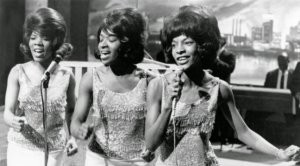
Martha Reeves & the Vandellas: A Desperate Plea in “Nowhere to Run”
The Motown sound is a tapestry woven with threads of joy, exuberance, and youthful optimism. Yet, within this vibrant sonic landscape, there exists a song that offers a stark contrast: “Nowhere to Run” by Martha Reeves & the Vandellas. Released in 1965, this track is a dramatic departure from the group’s usual upbeat fare, delving into the darker corners of love and desperation.
Background
It’s a testament to the versatility of the Vandellas and the songwriting prowess of Holland-Dozier-Holland that they could so effectively shift gears from the infectious dance rhythms of “Dancing in the Street” to the raw emotion of “Nowhere to Run.” This song is a masterclass in restraint and intensity, where the music serves as a haunting backdrop to Martha Reeves’ powerful vocal performance.
The song’s narrative is one of entrapment. The protagonist is caught in a toxic relationship, a prisoner of love, unable to escape the emotional turmoil she finds herself in. The lyrics are stark and direct, painting a vivid picture of a woman on the brink. The repetition of the title phrase, “nowhere to run,” becomes a mantra of despair, a constant reminder of her helplessness.
Musically, the track is a departure from the typical Motown formula. The arrangement is stripped down, focusing on a driving bassline, a steady drumbeat, and a haunting organ melody. The instrumentation is minimal, but it serves to amplify the emotional intensity of the song. The production is raw and immediate, creating a sense of urgency and desperation.
Martha Reeves’ vocal performance is nothing short of extraordinary. She delivers the lyrics with a raw vulnerability that is both heartbreaking and empowering. Her voice conveys the character’s pain, fear, and defiance with equal measure. The Vandellas’ backing vocals provide a haunting counterpoint, adding depth and texture to the song.
“Nowhere to Run” is a song that transcends its time. It is a timeless exploration of love, loss, and the human condition. The song’s themes of entrapment and desperation resonate with listeners of all ages and backgrounds. It is a reminder that even the most joyous and exuberant music can give way to moments of profound vulnerability and emotional depth.